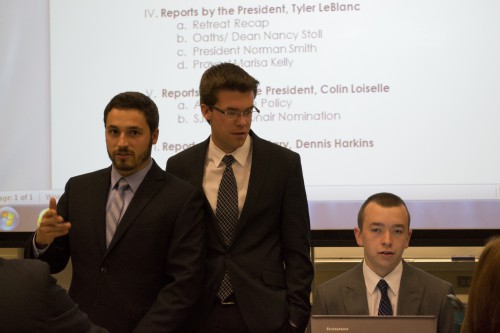The Student Government Association met for the first time last week along with members of Suffolk University’s administration to deliver plans for the year.

First on the agenda for SGA was to take the oaths of the newly elected senators, followed by the introduction of President Norman Smith.
“I haven’t even been here a month, and it just occurred to me that I haven’t even taken an oath yet, so I may not be president,” he said, bringing laughter to everyone in the room.
Smith began to address his upcoming initiatives for Suffolk University.
“It’s full of challenges. But not challenges that colleges and universities throughout the country are not facing.” Smith said, “One of the biggest ones that has to be overcome, and I think it can in time, is the problem of enrollment revenue-dependency.”
Smith explained there are a total of about 2,200 private independent colleges in America.
“Students want to go to school where the action is,” referring to the urban location of Boston colleges, and specifically Suffolk.
The problem is a lot of what Suffolk is doing is based on tuition dollars.
“We are 97 percent enrollment revenue-dependent,” the president said to the lecture room filled with dozens of students.
In order to bring this number down, Smith plans to find larger donors to invest in Suffolk.
“We’ve got alumni who have substantial wealth that could come invest in this place, and make tuition less [of] what pays for everything,” Smith said.
While alumni are sought for donations, Smith has another plan for them.
“Instead of focusing on being annual-giving donors, focus on, for lack of a better word, ‘adopt-a-student,’” Smith said.
Alumni would take students under their wing, get them in the workplace, and help them get discovered.
The president wanted to remind students to make those contacts and connections now.
“The most important thing students can do while they’re at college today is get discovered,” Smith said to the crowd.
Another challenge Smith wants to overcome is attracting positive recognition.
“We have to get this place on the radar screen,” he said. “Outside of Boston, Suffolk does not have the visibility, the reputation, and the stature it deserves.”
When students want to take their diplomas down to the mid-Atlantic area of the United States, Smith wants to make sure a degree from Suffolk is recognized for what it should be. “When you say ‘Boston colleges,’ people say, ‘Oh, Harvard, MIT, BU, BC, Northeastern, Babson, Tufts,’ that’s where it stops.”
Smith ditched the old marketing campaign by his fourth day as president, and is now in the midst of creating a campaign that targets the mid-Atlantic region, one that boasts only positive qualities.
Smith was asked whether plans for a new student center is in the future and replied, “It’s not in the works but it’s absolutely necessary … I’m going to need a couple more weeks,” he said.
When asked if he has plans to further integrate the New England School of Art and Design with the Suffolk campus, he said, “I’ve only been here three weeks, but I love the arts.”
Talking about our current facilities, Smith said, “We have to think about cost effectiveness…and relative location.” He hinted towards a plan to turn the law school bookstore into the “university non-book store,” and using the Cambridge Street location as a textbook store.
To sum up his objectives, Smith said, “I want this place to become rich and famous. I want diplomas to be extremely valuable, and become less enrollment revenue-dependent.”
Dean of Student Affairs Nancy Stoll addressed members of SGA.
“I commend you for your willingness to take on this role. It’s a very important role, and I can’t overstate that, because you are representing the students at this university … I meet with the SGA president once a week, and that’s a very important meeting,” said Stoll.
Vice President for Academic Affairs and Provost Marisa Kelly was also present to explain her role to the SGA members.
“Both academic affairs and student affairs report to me, so I think that’s really important for undergraduate students,” said Kelly.
Kelly later explained she wants to focus on the “total educational experience,” and that a student’s full experience, both in and outside of a classroom, is very critical.
The SGA’s first initiative was electing student Elainy Mata as the Vice Chair of the Student Judicial Review Board. She is responsible for helping Vice President Colin Loiselle coordinate board meetings and official business.
The SGA meets weekly to make sure students on campus are heard, and to communicate their opinions to the university’s administration.













